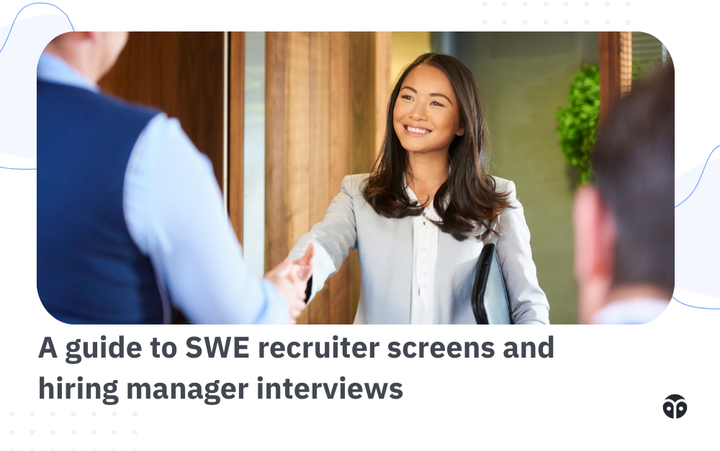How to postpone an interview
Learn how to politely postpone an interview, what to say to the recruiter, and how to know if waiting is the right move for you.

You finally got the message you've been waiting for — an email or LinkedIn DM from a recruiter at a company you’re excited about. Maybe it’s your dream company, or just a solid opportunity at a place you’d love to explore. But there’s a problem: you're not ready.
Maybe you’ve just started brushing up on coding fundamentals. Maybe you’re only a few weeks into serious interview prep. Either way, you know that if you took the technical screen or onsite today, it wouldn’t go well. So what now?
This situation is more common than you might think, and there’s a tactful, professional way to handle it that keeps the opportunity alive and protects your confidence. Here’s how to decide whether to postpone the interview and how to do it gracefully.
First, figure out if you should postpone at all
Before you decide how to respond, take a moment to evaluate the situation. There’s no universal right answer here — it depends on your goals, your readiness, and the company itself.
Ask yourself:
1. How excited am I about this company? If it’s your dream job or a company you’ve been targeting for months, it’s worth asking yourself whether you’d be okay losing the opportunity. If it’s not a top priority or you think it would be a good warm-up, you might decide to take the interview anyway and treat it as practice.
2. How prepared am I right now? Are you deep into Formation or another structured prep program and already passing technical screens? Or are you still early in your process, reacquainting yourself with the basics? Be honest with yourself.
3. What’s the risk of failing now? Many companies have a "cool down" period — often 6 to 12 months — before you can reapply or retry a failed interview. If you’re not ready, failing now might delay your actual opportunity to land the job later when you are ready.
4. What’s happening in the hiring market? If the company is well-known for having evergreen hiring (they’re always interviewing for certain roles), it’s more likely that the door will still be open later. On the flip side, if you’ve heard whispers of hiring freezes or reduced headcount, you may want to weigh the risk of missing the window altogether.
Typically, if a team match process is included in the hiring process for that company, it is well-known for having evergreen hiring. Postponing an interview is more common if you're interviewing for a pool of roles rather than one discrete role.
When in doubt, it’s okay to delay
Let’s be clear: you don’t need to jump at every opportunity the second it comes up. Great candidates take ownership of their timing. If you're not ready, it's better to pause, prepare, and return when you can confidently put your best foot forward.
Delaying an interview doesn’t make you flaky. It makes you intentional. But how you delay matters.
How to delay the interview the right way
Your goal is to preserve the relationship and the opportunity. That means being clear, respectful, and showing continued interest.
Here’s the strategy:
- Respond quickly. Don’t sit on the message for a week. Even if you’re delaying, replying within a day or two shows professionalism.
- Express enthusiasm. Make it clear that you’re interested in the company or role.
- Be honest and brief. Explain without going into too much detail
- Set a clear future action. Suggest a timeline for when you’ll follow up or invite the recruiter to check in with you later.
Example 1: General delay
Subject: Re: Opportunity at [Company]
Hi [Recruiter Name],
Thanks so much for reaching out. I'm really excited to hear about this opportunity.
I’m planning to start interviewing in [Month] and would love to reconnect then. Would it work for me to reach out a week or two beforehand to see if this role—or others—are still available?
Best, [Your Name]
Example 2: Dream company, want to be fully prepped
Subject: Re: [Company] Opportunity
Hi [Recruiter Name],
Thanks so much for reaching out. [Company] is one of my top companies, and I want to make sure I’m fully prepared to do well.
I’m currently brushing up on my CS fundamentals and practicing daily. Would it be possible for us to reconnect in about three months? If I feel ready sooner, I’ll be sure to reach out.
Best, [Your Name]
What if they say the role won’t be open later?
That depends on the company and the market. For larger companies, many technical roles are evergreen — meaning they’re always hiring strong candidates. But, some companies do have hiring freezes or limited openings, especially for junior roles. If that’s the case and you won’t be ready for months, it may be worth applying now just to get through the cool-down period while you continue preparing.
At smaller companies, roles often close once they’re filled. If it’s not a dream job and you’ve got some bandwidth, you might consider interviewing anyway — for practice.
When to go for it anyway
If you're on the fence, here's one strategy: interview anyway, knowing it might be a valuable experience, even if you don’t make it to the offer stage. As long as you treat it as a learning opportunity (and don’t let a potential “no” shake your confidence), you can start the cool-down clock and use the feedback to improve.
That said, this only makes sense if you can handle the outcome and still stay motivated. If you know a rough interview would rattle you or set back your confidence, it’s better to wait and come in strong.
The bottom line
There’s no one-size-fits-all answer, but if you’re not ready and want to give yourself the best chance of success, it’s absolutely okay to delay. Being thoughtful and strategic about your timing — and communicating clearly with recruiters — shows maturity and professionalism.
It’s your career. Take your time and own the timeline.
Get holistic interview prep with Formation
The Formation Fellowship gives mid-level and senior engineering job seekers everything they need to land their dream roles—including personalized skill brush-ups, resume help, unlimited mock interviews with experienced software engineers and hiring managers from top-tier tech companies, career and negotiation support, and more.
If you’re having trouble navigating your job search on your own, apply here and get unconditional support from a team of engineering mentors, technical recruiters, career coaches, and more.



